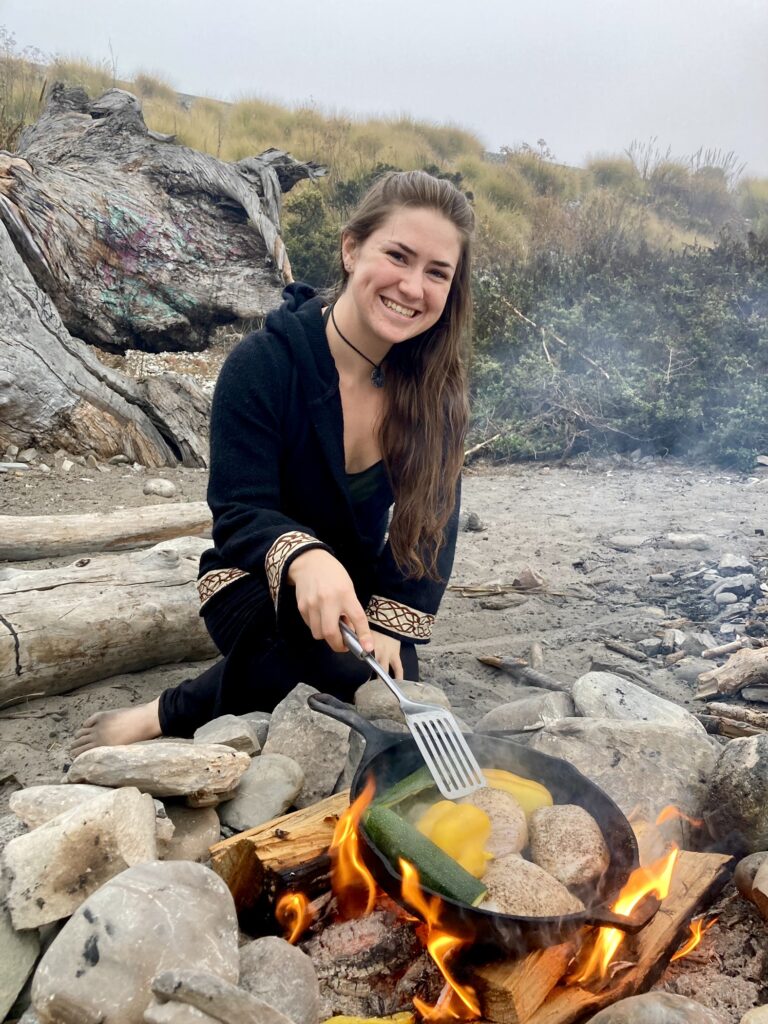Overcome Your Gut + Digestive Issues With Ancestral Nutrition
8 Ways To Avoid Toxins In Your Food

I’ve been talking a lot about toxins lately, and today I want to focus on the toxins in foods and how to avoid them. Toxins in foods include additives, preservatives, herbicides, pesticides, micro-plastics, endocrine dysruptors (like xenoestrogens), heavy metals, chemicals from the water supply, and more.
Over time exposure to these toxins can cause cancer, chronic diseases, hormone issues, fertility issues, skin problems, digestive problems, leaky gut, autoimmune diseases, immune dysfunction, ADHD, autism, and more! (1, 2, 3, 4, 5, 6, 7)
So how can you avoid toxins in your food?
1) Buy Foods Closest To Their Natural State
Buy whole foods like grass fed steak, raw whole milk (that hasn’t been homogenized), and seasonal fresh fruits and veggies. Avoid prepackaged and processed foods for these often have additives, preservatives, sugar, vegetable oils, and other toxins.
2) Buy Organic
Unfortunately pesticides and herbicides are now widely used. In fact billions of pounds of the most common herbicide: Round Up (aka glyphosate) have been applied globally since the 70s. (7) Therefore it’s really important to buy as much food organic as you can. If you can’t buy all organic, prioritize fruits and veggies with very thin skins and ones known to be treated with lots of pesticides like strawberries, spinach, kale, nectarines, apples, grapes, cherries, peaches, pears, peppers, celery, and tomatoes. These are also known as the “dirty dozen.” It’s really important to get organic coffee as well, for coffee is the most pesticide ridden crop in the world! (8, 9)
3) Buy Local
Getting to know your farmer and going to farmers markets goes hand and hand with this one. Small local farms typically have much higher quality produce with more nutrients and less toxins! Also the organic certification process is very expensive and time consuming so many stands at the farmers market are technically organic even though they don’t have a sign saying certified organic. Sometimes they’ll say pesticide free or you can ask them.
4) Buy Food That’s Not In Plastic As Much As Possible
This one is very hard, I know! But try to avoid plastic packaging as much as possible because the micro plastics and endocrine disrupting chemicals can leach into your food. Also bringing your own reusable produce bags is helpful for this! Plus it’s good for the environment!
5) Grow, Hunt, And Forage Your Own Food
While I know this doesn’t work for everyone, it’s truly one of the best ways to optimize your food quality and minimize toxins. Even a few pots for some herbs and veggies or weekend fishing trips are a great start!
6) Get Fish Lower On The Food Chain
Unfortunately heavy metals have really polluted a lot of water sources and these are prone to storage in fish. When big fish eat smaller fish they also get their heavy metals. So it’s best to eat smaller fish and fish from the best sources you can.
7) Use Glass, Ceramic, And Stainless Steal Tupperwares And Bees Wax Cloths For Food Storage
This will help you avoid plastic and the micro-plastics and endocrine disruptors that come along with plastic. If you do use some plastic, please avoid putting hot food in plastic, because the plastic chemicals are more likely to leach into your food when it’s hot. Also I recommend using stainless steal or glass water bottles as well.
8) Get A Water Filter
Our tap water is filled with so many toxins like fluoride, pharmaceutical drugs, heavy metals, and more. Therefore a quality water filter is one of the best investments you can make for your health and one of the best ways to decrease your toxin exposure. A good shower filter is a nice bonus too! If you want to learn more about what’s in tap water and why you should probably get a water filter, check out this post!
Works Cited
1. “Do Berkey Filters Remove Lead?” Berkey Filters. Accessed 7 July 2021. https://www.berkeyfilters.com/pages/do-berkey-water-filters-remove-lead
2. Jaishankar, Monisha et al. “Toxicity, mechanism and health effects of some heavy metals.” Interdisciplinary toxicology vol. 7,2 (2014): 60-72. doi:10.2478/intox-2014-0009
3. “Lead Fact Sheet.” Water Quality Association. Accessed 7 July 2021. https://www.wqa.org/Portals/0/Technical/Technical%20Fact%20Sheets/2016_Lead.pdf
4. Schoenfeldrd, Laura. “Is Glyphosate Behind Your Gut Symptoms?” Laura Schoenfeldrd. Accessed 7 July 2021.https://lauraschoenfeldrd.com/glyphosate-gut-health-symptoms/
5. Katja. Savory Lotus. Accessed 10 June 2021. https://www.instagram.com/savorylotus/
6. Mercola, Joseph. “MIT Scientist: How Glyphosate Destroys Your Health.” The Defender. 30 June 2021. https://childrenshealthdefense.org/defender/stephanie-seneff-toxic-legacy-glyphosate-destroying-our-health/
7. Hyman, Mark. “The Harmful Effects of Weedkiller (Glyphosate) On Our Health And Our Future.” Dr. Hyman. Accessed 7 July 2021. https://drhyman.com/blog/2021/06/30/podcast-ep177/
8. “Is Coffee Good For You? | The Pros and Cons of COFFEE!” YouTube, uploaded by Health Coach Kait, 18 February 2020, https://www.youtube.com/watch?v=HigBQEV5mqg
9. Corrine. “Coffee & Pesticides: What’s in Your Coffee Can Hurt Your Health.” Tox Free Family. Accessed 15 June 2020. https://toxfreefamily.com/pesticide-free-organic-coffee/

